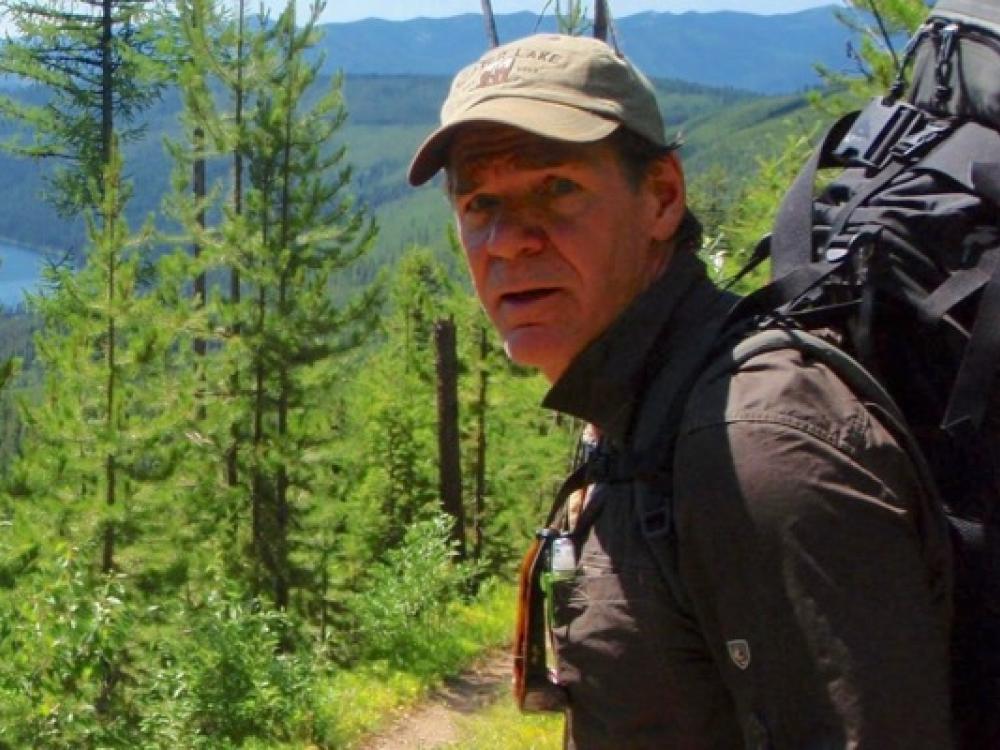
Mick Tune, the author of Wildering, in his element. Photo courtesy of the Mick Tune.
Jan. 14, 2020
 Mick Tune wants you to get out. Not just to the local park, but get out and away from crowds, from amenities, from all that you know best by being curious.
Mick Tune wants you to get out. Not just to the local park, but get out and away from crowds, from amenities, from all that you know best by being curious.
Go backpacking, he exhorts in his book Wildering: Anyone’s Guide to Enjoying the American Wilderness.
“All that fun and discovery requires is being able to walk and to plan. Use your evolutionary advantages; you are good at walking, and you have an unusually large brain. Your opposable thumbs will come in handy, too,” writes Tune, a resident of Rockwall.
Wildering has racked up over 15,000 Kindle downloads. The blend of advice, musings and trail stories is an enjoyable walk-through of how to get started in walking wildlands, from extended day hikes to overnight backpacking.
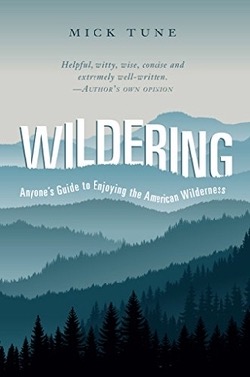 “This book is intended to help you do what 99.9 percent of Americans don’t do: get out there a ways! Moreover, it’s intended to help you to enjoy that experience. Other than having fun with it and telling some stories, it has a really a simple point: Just about anybody can do this with a bit of education,” says Tune.
“This book is intended to help you do what 99.9 percent of Americans don’t do: get out there a ways! Moreover, it’s intended to help you to enjoy that experience. Other than having fun with it and telling some stories, it has a really a simple point: Just about anybody can do this with a bit of education,” says Tune.
A few Tune tips from Wildering:
•Wear proper walking shoes. Flips flops are not them. Your kids should be whiny if you are making them walk several miles in cheap, horrible, plastic shoes.
•Buy and learn how to read and use an old-fashioned, paper topographic trail map. Technology is not a reliable friend in the wilderness. Keep a real trail map with you at all times, even on a day hike.
•Try planning a backpacking trip in which you establish a base camp for several days and then take day hikes from that camp to other points of interest.
•Add an hour for a long lunch and an hour or two for exploring a site of interest. I am not interested in speed records. I am out there to enjoy the place and the pace.
•Once you are out there, the most important rule is don’t be stupid. Recognizing that the range of human stupidity is probably infinite, this book cannot possibly warn you about every dumb thing that could be done.
CURIOSITY IS KEY
Tune writes in Wildering:
“If you have even moderate brain activity, I believe you will find it impossible to walk out into the world without being curious about what you see around you and learning something about the world right at your feet. Hiking — simply taking a few walks and noticing the surroundings — got me into geology, volcanology, paleontology, archeology, and astronomy.“
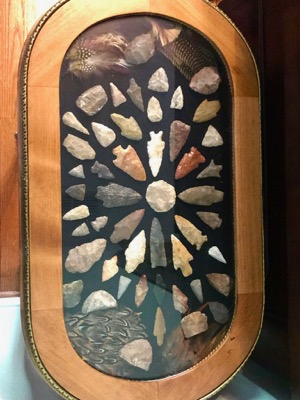 Mick Tune's arrowhead collection. Photo by Amy Martin.
Mick Tune's arrowhead collection. Photo by Amy Martin.
While we are all prone to flights of curiosity, Tune is a deep diver:
“For a long time every year as sort of a New Year’s resolution, I would pick a subject I wanted to learn more about. I’ve done astronomy, scuba diving, art collection, and so on. One year I picked paleontology and it stuck. A couple of years ago, it was to see if I could figure out how to write a book and get it published.”
The result is Wildering.
“Some of it is just being curious and deciding you like to learn things and seeing where that takes you,” says Tune. “Every kid you’ve ever met is curious. It’s not like it’s deficient in some people. Most people are naturally curious. We just bury it. People kind of ignore it.”
Tune’s curiosities usually have a physical component and involve being outside.
“Really it does come from just being. If you’re out in nature, you see things and wonder about them. ”
But the real key for learning, Tune says, is being with people:
“If you want to learn about something, go find some people who know a lot more about it than you do, hang around with them, let them teach you. It’s not hard to find interest groups that will share their passion with you.”
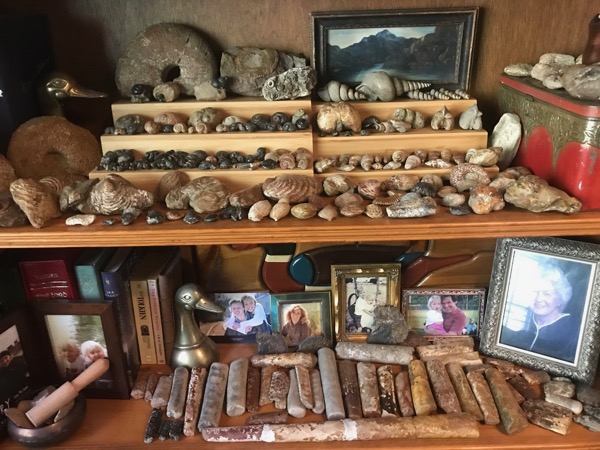 Part of Mick Tune's vast fossil collection. Photo by Amy Martin.
Part of Mick Tune's vast fossil collection. Photo by Amy Martin.
FOSSIL FASCINATION
Ten years ago, Tune decided to make paleontology his annual curiosity focus. He gravitated toward the Dallas Paleontological Society and soon discovered Ladonia Fossil Park, located about 75 miles northeast of Dallas. Erosion along the North Sulphur River exposes plentiful marine fossils from the late cretaceous period, about 80 million years ago.
“Wish I’d known earlier what a treasure trove we have out here,” says Tune. “It’s fun for me, because of the hiking and because it has to do with rivers and rocks and dirt.”
Tune found he resonated with paleontology because of its depth and breadth:
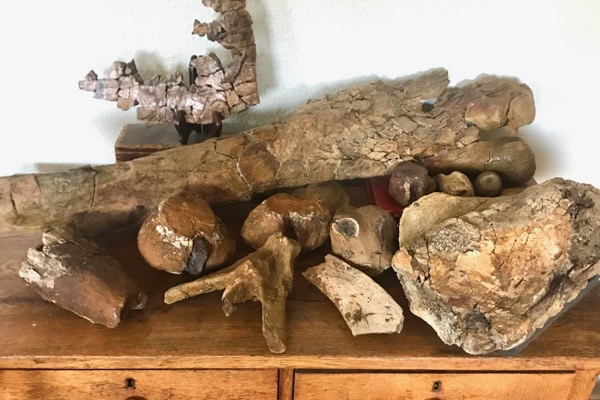 “It’s something you can explore in a lot of different ways. If you really want to understand fossils, you have to look into biology, ecosystems, botany, zoology, chemistry. It’s one of those fields that pulls in a lot of other fields.”
“It’s something you can explore in a lot of different ways. If you really want to understand fossils, you have to look into biology, ecosystems, botany, zoology, chemistry. It’s one of those fields that pulls in a lot of other fields.”
Besides, he adds, “Amateur fossil hunting is just hiking with a purpose.”
But the future of the Ladonia Fossil Park is ambiguous. Plans by the Upper Trinity Regional Water District are to begin construction in 2020 of the 12,000-acre Lake Ralph Hall by impounding the North Sulphur River in Fannin County.
“We’ll see how things change when they build the lake out there. It will make a major impact. Half of that branch of the river will go away,” says Tune.
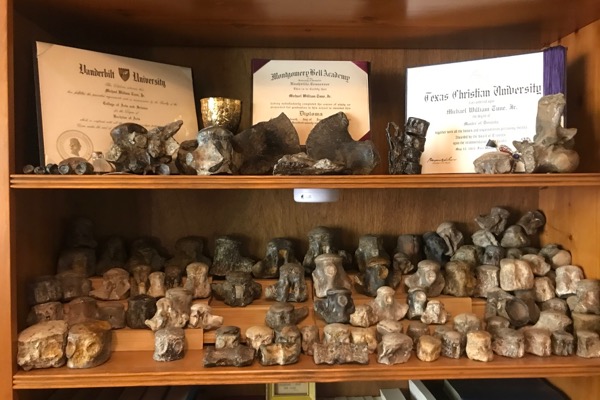 At the National Fossil Day festivities at the park last October, topics included riverbed versus lakeshore fossil hunting. Tune is always a popular speaker at the event, toting boxes of fossils he’s found in the North Sulphur River and elsewhere found for children and adults to view. Coprolites, being fossilized dinosaur dung, are a huge hit with kids.
At the National Fossil Day festivities at the park last October, topics included riverbed versus lakeshore fossil hunting. Tune is always a popular speaker at the event, toting boxes of fossils he’s found in the North Sulphur River and elsewhere found for children and adults to view. Coprolites, being fossilized dinosaur dung, are a huge hit with kids.
More evidence of Mick Tune's passion for paleontology. Photo by Amy Martin.
“People often ask me at these digs ‘What are these things worth?’ as if trying to make money off of them,” says Tune. “Marine fossils are pretty common. If you get to the right layer, it’s pretty much worldwide distribution. But they’re worth something to me.”
The true value, Tune notes, is in their philosophical worth getting people to consider time more profoundly and develop a sense of wonder in things they’ve never noticed before.
Of his paleontology obsession, Tune says: “Some of it is just being curious and deciding you like to learn things and seeing where that takes you.”
Stay up to date on everything green in North Texas, including the latest news and events! Sign up for the weekly Green Source DFW Newsletter! Follow us on Facebook and Twitter. Also check out our new podcast The Texas Green Report, available on your favorite podcast app.









